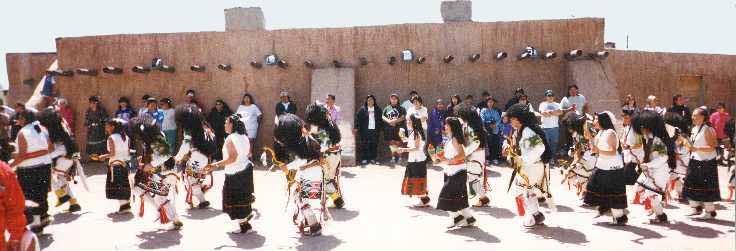Wonder Johns first Native American moderator of Big Lakes association
By Joni B. Hannigan
“We had no houses, we lived in the Chickees,” Johns said softly, describing a palmetto thatch roof over a cypress log frame—with open sides. “The mosquitos ate us up.”
Sleeping on a table-like platform with primitive nets to keep out all manner of bugs, Johns remembers a “wild” childhood, hunting, fishing and playing—and taking baths in ponds or canals—but rarely going to school.
And then the pesky missionaries would visit camp.
“Us little kids, we would run away,” Johns, 77, smiled slightly. “‘Here comes the preacher,’” he recalls children telling each other. “We would take off in the woods and stay there until he leaves and then come back out.”
“They start coming to church and they’ve been baptized and they still go out to the Green Corn Ceremony and dances,” Johns said. “They think they can come back and still worship the Lord and nothing’s wrong.
“In my service I tell them God gave us something when we didn’t have anything, but now we know better,” Johns said. “Like the Bible says in Acts 17:30, God winked at what went on, but now we know better [and] God expects us to repent and worship Him because God has given us something because [before] we didn’t have any way of worshipping God.”
Last year Johns retired as pastor of First Indian Baptist Church of Brighton, just north of the Brighton Seminole Reservation in Okeechobee. Recently he finished a term as moderator of the Big Lake Baptist Association, and served previously as the associate moderator. According to Florida Baptist Convention records, he is the first Native American to have served in that capacity in Florida.

Comment: Really? Indians are famous to the point of stereotyping for their religious ceremonies: dances (e.g., rain dance, Snake Dance, Sun Dance), vision quests, sweat lodges, purification rites, etc.
But they didn't have any way of worshiping the Creator? What were they doing until Christians came along and hit them over the heads with their Bibles? Playacting? Doing fake dances for the tourist trade? While worshiping trees and rocks, not God?
Because the only way to contact God is sitting on hard benches in a squarish building while a man in a robe drones on? Yeah, because the Bible is so specific about how one should worship. If you don't kneel and genuflect in exactly the right way, you'd damned to hell.
Coming from an elder in the Seminole tribe, this sure sounds like an ignorant comment to me. I suspect your average 5-year-old has a better understanding of how worship works.
Indians know God
In reality, many Indians are Catholics, Protestants, and Mormons while also holding to their traditional religious beliefs. It's not hard to do. You just pick and choose from the Bible--as Christians have always done.
Jesus was one holy being...but there are others all around us. You can reach them by praying, singing, meditating, dancing, or helping others--anything that shows you have good intentions and a good heart. If God exists at all, you can bet he doesn't care about the petty details of your religion.
There's your theological lesson for today, Pastor Johns. Learn it so I don't have to repeat it, okay?
For examples of what many Christians think about Indians, see Catholic Church Abuse on Frontline, Fischer Worships "God" of Racism, and God Good, Father Sky Bad?
For more on the subject, see The Gospel of the Redman, Christians Reject Christ's Message, and 10% of Indians = Christians.
Below: Worshiping God at the Ohkay Owingeh Pueblo.


A lot of it is the idea of a Christian CONCEPT of God. In that sense, Indians didn't; hell, three is the number of Iktomi, not exactly someone deserving of veneration. Of course, in that sense, Jews and Muslims don't, since the Jewish God plays ethnic favorites, and Muslims have no concept of the Trinity. But of course, indigenous theology is far more alien to Christian notions of God than that.
ReplyDeleteIt is hard to be a Mormon and hold on to traditional ndn beliefs. Because, you know, Mormons have some, ah, "interesting" ideas about our history.